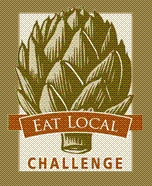
I work for a large global company. My office campus has a cafeteria which is outsourced to a national catering/food services company. The food services company has designated Tuesday October 3 as "Eat Locally Day." The chef has defined "eating locally" as purchasing food grown/made within a 150 mile radius. He buys all of the food he uses for the cafeteria within a 150 mile radius, every week. I was amazed, not only that everything he serves us is grown locally, but at the variety of food that he provides us. Even the beef is local and it is certified Angus beef. The rancher knows his cattle from birth to slaughter and has a booth at the area Farmer's Market (the one downtown). I knew that we had access to quite a bit of fresh food, but the extent of local food really is astounding. I now really have no excuse for not supporting local farmers. Try, if you can, to eat locally tomorrow.
Eating (and cooking) locally, along with spinning and knitting, has a strong conscientious consumerism vibe. To often, I find myself just consuming things without any regard to what I am consuming, and I don't just mean food. Everything I purchase is a comsumption of some sort. Energy, both human and other, were exerted to make what I am buying. Resources where consumed in the production, transportion, and display of my purchases. Plus, once it gets to my house, it is going to consume space. My purchase is also a vote of support for the production method or for the item or for the practices of the company. All too often, I don't take the time to make a conscientious decision about what I am buying. I just spend my money. For today and tomorrow, I will work hard at thinking through my purchases and will try not to consume anything I don't need. (I need yarn, so I'll consume as much of that as I can. If you don't believe me, you can ask Italian. He'll willing admit that I need yarn to stay calm.)
So, how does spinning and knitting fall into conscientious consumerism? I have found that quite a few knitters out there support local yarn shops or small yarn producers. These knitters want to know the source of their yarn. Some spinners work out an arrangement with sheep herders and recieve their fleece from one particular sheep. I'm not naive enough to think that in this global economy, I will be aware of the full lifespan of everything I buy. It isn't really practical, and it may not be the best, but I can at least work harder at being a better consumer.
2 comments:
I am ALL for consuming locally, but can't. Do you know how little (other than citrus) will grow in Florida.
I was looking for a CSA co-op to buy vegetables. There is ONE within 100 miles of us and it would be an hour and a half away. Hardly economically wise or environmentally. :-( I wish more was available locally here.
Many co-ops are "underground" so keep looking. This is because one can only get un-pasturized products if one is the producer of those products. So, there are usually co-op share fees upfront so that each participant is an owner in the hurd/farm/whatever. And the easiest way to keep away from questions that may lead to problems is to be on a 'dont ask dont tell' level with advertisement, etc. So, ask around. Ask at your local health food store.
Or, get a couple pots or till part of your yard and grow your own. Or, look for one of those communal gardens that many communities have. Many of the members of the community gardens sell their extras. Or get a garden plot there yourself.
Lots will grow in FL. Actually, you have two growing seasons. Summer for cotton, corn, and other hot weather plants. Winter for okra, peppers, chard, collard, and other cooler weather plants. Call your extension office for growing information.
Post a Comment